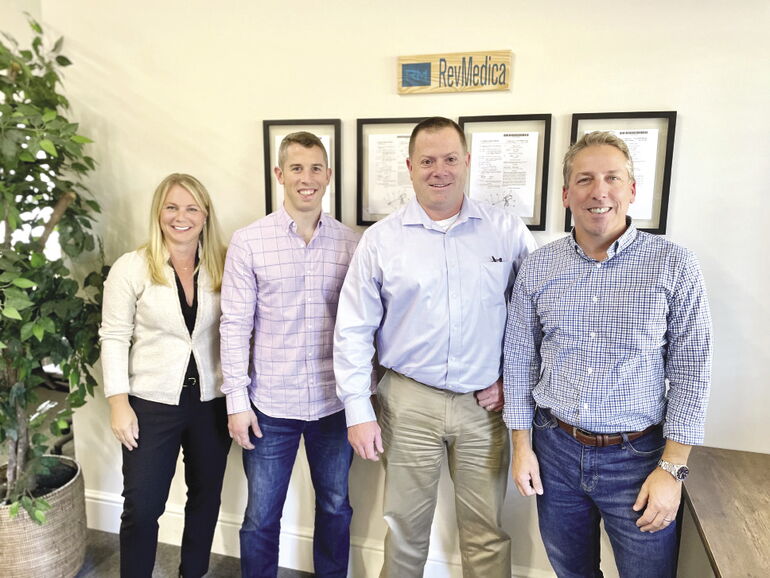Processing Your Payment
Please do not leave this page until complete. This can take a few moments.
-
News
-
Editions
-
- Lists
-
Viewpoints
-
HBJ Events
-
Event Info
- 2024 Economic Outlook Webinar Presented by: NBT Bank
- Best Places to Work in Connecticut 2024
- Top 25 Women In Business Awards 2024
- Connecticut's Family Business Awards 2024
- What's Your Story? A Small Business Giveaway 2024 Presented By: Torrington Savings Bank
- 40 Under Forty Awards 2024
- C-Suite and Lifetime Achievement Awards 2024
- Connecticut's Health Care Heroes Awards 2024
-
-
Business Calendar
-
Custom Content
- News
-
Editions
View Digital Editions
Biweekly Issues
- April 15, 2024
- April 1, 2024
- March 18, 2024
- March 4, 2024
- February 19, 2024
- February 5, 2024
- January 22, 2024
- January 8, 2024
- Dec. 11, 2023
- + More
Special Editions
- Lists
- Viewpoints
-
HBJ Events
Event Info
- View all Events
- 2024 Economic Outlook Webinar Presented by: NBT Bank
- Best Places to Work in Connecticut 2024
- Top 25 Women In Business Awards 2024
- Connecticut's Family Business Awards 2024
- What's Your Story? A Small Business Giveaway 2024 Presented By: Torrington Savings Bank
- 40 Under Forty Awards 2024
- C-Suite and Lifetime Achievement Awards 2024
- Connecticut's Health Care Heroes Awards 2024
Award Honorees
- Business Calendar
- Custom Content
Early-Stage Guidance: With growing venture capital, other needs, accounting firms look to startups for growth opportunities
 photo/contributed
Accounting firm FML’s Julie Gionfriddo (far left) and Frank Milone (far right) are helping RevMedica co-founders C. Robert Satti III (second to left) and Thomas Wenchell raise money and manage the choppy waters of operating their medtech startup.
photo/contributed
Accounting firm FML’s Julie Gionfriddo (far left) and Frank Milone (far right) are helping RevMedica co-founders C. Robert Satti III (second to left) and Thomas Wenchell raise money and manage the choppy waters of operating their medtech startup.
After 20 years working for a large medical technology manufacturing company, Thomas Wenchell knew a lot about medical devices.
But when he and his business partner founded their own company RevMedica Inc. in 2017 to introduce a new laparoscopic stapling device into the market, they were in unfamiliar territory: running a startup.
“The biggest challenge was setting expectations,” Wenchell said. “You don’t realize how hard it’s going to be to raise money, how long it will take to get things done and get people on board.”
To help navigate the increasingly complex landscape of venture capital, tax and business planning that are essential to a startup’s short- and long-term viability, Wenchell turned to Fiondella, Milone & Lasaracina (FML), an accounting firm that has provided advisory services to startup and early-stage companies since its founding in 2002.
The company is based in Glastonbury but opened an office in New Haven three years ago in The District to be closer to the Elm City’s growing startup scene.
Frank Milone, one of FML’s founding partners who oversees the firm’s advisory services, says the impact of the Sarbanes Oxley Act of 2002, which increased tighter auditing and financial regulations for public companies, created an opportunity for his firm at a time when many larger accounting firms moved their focus up-market.
“There was a gap within the ecosystem [of providers] catering and serving the startup environments,” Milone said.
But as venture capital both in Connecticut and nationally has been pouring into startups at record levels — more than $130 billion in venture capital was invested in the U.S. alone in 2020, according to PwC data — more accounting firms are increasing their focus on the riskier, but growing early-stage market.
One of those firms is Marcum LLP, which has offices in both Hartford and New Haven.
Ethan Brysgel, the firm’s national financial accounting and advisory services practice leader, says his firm has been investing more heavily in resources over the past five years to better support startups, which all have basic accounting needs.
“Even if [startups] don’t have customers yet, they still have vendors to pay and cash flow to track,” Brysgel said. “The outsourced model [for accounting] is very attractive to a startup.”
Brysgel says the number of startup clients his firm is serving has increased five-fold over the past half-decade and Marcum is continuing to build out its expertise in this market.
In May, Marcum announced its financial accounting and advisory services practice was merging with Starter Fluid LLC, a Boston-based company specializing in CFO-led services to better help early-stage and rapidly-growing companies scale successfully.
“As companies grow, their needs increase — whether it’s a tax issue, company valuation or more complex accounting,” Wenchell said.
Right fit
FML’s Milone says the level of advisory expertise required among startups has evolved as the complexity and size of venture capital investment has increased.
“One of the challenges that we see with entrepreneurs early on is that they tend to seek out advice from people they know, so they may start with a smaller firm,” Milone said. “But [those connections] may not have expertise in startup company formation or the sophisticated [venture] capital means involved.”
Milone says nearly one-quarter of the 75 members of his advisory services team is dedicated to startup clients, including expertise in state tax credits and cryptocurrency, which is gaining traction with select venture capital firms.
Matt McCooe, CEO of Connecticut Innovations, the state’s quasi-venture capital arm, says accounting firms that go beyond a startup’s financials to focus on business-building are in high demand.
“Every startup is looking to grow it’s customer relationships and partners,” McCooe said, “and firms that support the growth of a business make themselves attractive to new [early-stage] clients.”
And business-related issues — according to CBInsights survey data — are among the top reasons startups fail, including lack of new capital (38%), flawed business model (19%) and regulatory and legal challenges (18%).
Julie Gionfriddo, FML’s director of advisory services, says Connecticut’s expanding startup market and venture capital trends have created a robust opportunity for advisory services.
In 2019, Connecticut ranked among the top five states in the country for year-over-year venture capital growth, according to the National Venture Capital Association. In 2020 Connecticut ranked 16th overall in venture investment with more than $1.2 billion invested, second only to Massachusetts among New England states.
Gionfriddo, who’s worked in health care, medical device and life sciences for more than 20 years and typically works with her startup clients for six to nine months, says one of the most important roles she plays is connecting startups to people with the right appetite for the market a company is in and identifying the best path forward, even when it means turning away much-needed capital.
“It’s about finding the right balance and the right terms,” Gionfriddo said. “A company may not want to take on too much capital or give up too much equity control of their company.”
Wenchell, of RevMedica, says one of the main benefits of working with Gionfriddo was developing a venture capital mentality.
“My business partner and I are both technologists and engineers, but we [needed to learn] what makes a venture capitalist tick, how do they communicate and how do they like to be communicated to,” Wenchell said. “It’s really making sure we [as a startup] check all the boxes.”
And his startup, he says, is making timely progress. RevMedica, which relied on tax credits, $250,000 in seed funding and Paycheck Protection Program funding during COVID, has lined up $3 million in additional capital with a goal of raising $6 million to further develop its product and move toward Food and Drug Administration approval.
Gionfriddo said she remains bullish on the opportunity for more startups from both UConn and Yale.
“Connecticut has a very strong talent pool and a lot of momentum as people look to build businesses here,” she said.

2022 Giving Guide
This special edition informs and connects businesses with nonprofit organizations that are aligned with what they care about. Each nonprofit profile provides a crisp snapshot of the organization’s mission, goals, area of service, giving and volunteer opportunities and board leadership.
Learn more
Subscribe
Hartford Business Journal provides the top coverage of news, trends, data, politics and personalities of the area’s business community. Get the news and information you need from the award-winning writers at HBJ. Don’t miss out - subscribe today.
Subscribe
2024 Book of Lists
Delivering Vital Marketplace Content and Context to Senior Decision Makers Throughout Greater Hartford and the State ... All Year Long!
Read Here-
2022 Giving Guide
This special edition informs and connects businesses with nonprofit organizations that are aligned with what they care about. Each nonprofit profile provides a crisp snapshot of the organization’s mission, goals, area of service, giving and volunteer opportunities and board leadership.
-
Subscribe
Hartford Business Journal provides the top coverage of news, trends, data, politics and personalities of the area’s business community. Get the news and information you need from the award-winning writers at HBJ. Don’t miss out - subscribe today.
-
2024 Book of Lists
Delivering Vital Marketplace Content and Context to Senior Decision Makers Throughout Greater Hartford and the State ... All Year Long!
ABOUT
ADVERTISE
NEW ENGLAND BUSINESS MEDIA SITES
No articles left
Get access now
In order to use this feature, we need some information from you. You can also login or register for a free account.
By clicking submit you are agreeing to our cookie usage and Privacy Policy
Already have an account? Login
Already have an account? Login
Want to create an account? Register
Get access now
In order to use this feature, we need some information from you. You can also login or register for a free account.
By clicking submit you are agreeing to our cookie usage and Privacy Policy
Already have an account? Login
Already have an account? Login
Want to create an account? Register






0 Comments